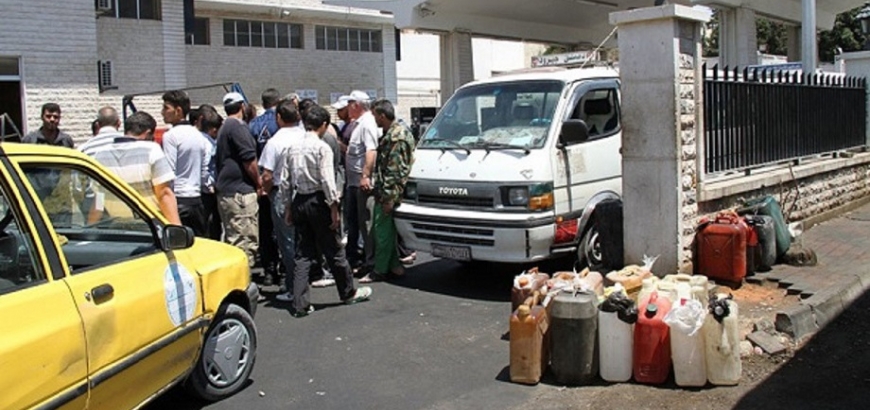On Sunday, the Bashar al-Assad regime took new austerity measures to confront the fuel crisis in the areas it controls, while the Oil Ministry announced that: “the crisis is related to oil boats not reaching Syrian ports due to economic sanctions.”
Months after a severe shortages of gas canisters and fuel oil in particular, the crisis has now expanded to include gasoline, pushing the regime a few days ago to take measures that reduced the daily amount permitted to private cars from 40 liters to just 20 every two days.
During Sunday’s meetings, the cabinet decided to, “develop new measures to control the distribution of gas station allocations.” It also decided to reduce the volumes of gas allotted to government owned vehicles by 50 percent, and to develop mobile fuel stations, and to put stations that have ceased operating back into operation, under direct supervision of the Oil Ministry.
For several days, regime-controlled areas have witnessed traffic at fuel station, which has forced car drivers to wait in lines that extend for hundreds of meters.
Officials in the regime have repeatedly blamed the economic sanctions imposed by a number of Arab and European countries as well as the United States, which have prevented oil tankers from reaching Syria.
On its Facebook page, the Oil Ministry said on Sunday: “No one can deny the severity of the economic sanctions imposed on our country, which target the oil sector in particular, and which are preventing oil tankers from reaching Syria, causing severe bottlenecks of oil derivatives.” The Ministry said work was underway to resolve the crisis.
The oil sector has suffered heavy losses over the last eight years, with most oil and gas fields still under the control of the American-backed Syrian Democratic Forces in northern and eastern Syria.
The recent American sanctions against Tehran—one of Damascus’s main backers—have intensified the fuel crisis in Syria, which relies primarily on a credit line linking it to Iran to secure oil.
During a meeting with a number of local journalists 10 days ago, Prime Minister Imad Khamis said that the Iranian credit line had stopped six months earlier, adding that the Suez Canal had not allowed oil tankers to reach Syria for six months. He pointed to a communications “failure” with the Egyptians. The lack of fuel has also led to “a decrease in the quantity of electricity being produced.”
This article was translated and edited by The Syrian Observer. Responsibility for the information and views set out in this article lies entirely with the author.


